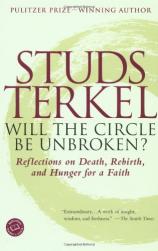Reading Group Guide
Discussion Questions
Will the Circle Be Unbroken?: Reflections on Death, Rebirth, and Hunger for a Faith

1. If you had been one of the people Terkel interviewed for Will the Circle Be Unbroken?, what would you have told him?
2. Do you talk about death with your close friends or family? Do you feel that you would have been able to open up to Terkel in the way that the people in this book did?
3. What do you think it is about Terkel that enables him to draw these amazing, painful, personal stories out of people?
4. Is there anyone in this book whom you felt particularly akin to, in terms of how he or she spoke about death or what comes after it?
5. Do you think of yourself as religious or spiritual? If so, how does that play into your feelings on death?
6. Do you agree with Terkel's contention in the introduction that "Invariably, those who have a faith, whether it is called religious or spiritual, have an easier time with loss"?
7. How do the various faiths differ in the ways they address death? Are there certain faiths that consider death in a way that's especially helpful or comforting?
8. Terkel's cardiologist comments to him, "Dealing with death is a third-rail issue in the United States. We don't talk about death and dying as a societal problem, but it's going to become more and more of one." Are Americans particularly loath to talk about death? How would you compare our way of dealing with death with the ways of other cultures and countries?
9. Several people in Will the Circle Be Unbroken? describe dramatic near-death experiences, in which they were drawn toward a light and told they had to keep on living or saw their own bodies as they floated above them. Have you ever had or heard about a near-death experience?
10. In the introduction, Terkel quotes a writer who laments how people are expected to hold their grief inside. "We want sort of drive-by grieving. Nobody wants you to carry on about it. They want you to deposit it like you do in a bank." Do you agree that our society discourages people from talking about their grief and their own fears about death?
11. Did September 11 change the way you think about death? Do you think it will have a long-term effect on how our society deals with and wrestles with death?
12. Terkel interviewed a homicide detective, a former death-row inmate, a Hiroshima survivor, an undertaker, and many, many others. Aside from the people in the book, who else's perspectives on death would you be interested in hearing?
13. Several interviewees talk about how it used to be that people would die at home and their bodies would be left in darkened parlors for weeks so that people could come in to visit and pay their respects. Now people die in hospitals, and the bodies are whisked away. Our society is very far removed from the particulars of death. Do you think this distance has changed the way our society thinks about death or deals with it?
14. This book offers all sorts of different perspectives on whether or not there's an afterlife–from people who believe that death is just a transformation from one state of living to another to those who believe that after death there's nothing. Do you believe that there's an afterlife? If so, how do you envision it?
15. Kid Pharoah, a self-described "collector" whom Terkel has interviewed several times, said to him, "The great fear I have is dying a failure. We all go. I don't want to go out a nothing. I want to go out a man among men." What is your great fear about death? How would you liked to be remembered when you die?
Will the Circle Be Unbroken?: Reflections on Death, Rebirth, and Hunger for a Faith
- Publication Date: November 26, 2002
- Paperback: 448 pages
- Publisher: Ballantine Books
- ISBN-10: 0345451201
- ISBN-13: 9780345451200







